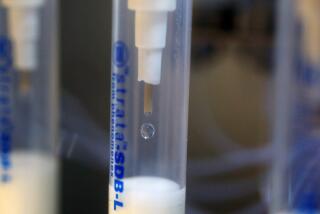PFCs associated with lowered response to childhood vaccines
Exposure to perfluorinated compounds, or PFCs, a class of chemical used in food packaging and textiles, was associated with a lowered immune response to the tetanus and diphtheria vaccines in 5- to 7-year-olds in the Faroe Islands, researchers reported Tuesday in the journal JAMA.
The scientists followed close to 600 children from the islands, which are in the Norwegian Sea north of Scotland and are a self-governing part of the Kingdom of Denmark, because people there eat a lot of seafood. A marine-based diet is associated with increased exposures to PFCs, according to background information in the JAMA report.
But the U.S. Environmental Protection Agency has been concerned about exposure to the chemicals in U.S. citizens as well, and has been scrutinizing PFCs for years. The compounds can remain in the body for many years. Studies in lab animals have linked them to developmental and other health problems, the EPA says.
The kids who participated in the Faroe Islands study were born between 1999 and 2001 at National Hospital in Torshavn, Faroe Islands. All received their immunizations, including tetanus and diphtheria vaccines, according to the official Danish program. The researchers measured prenatal exposure to PFCs, which can travel through the placenta, by collecting serum from the mothers when they were 32 weeks pregnant. Researchers measured exposure in the children when they were 5 years old before they had booster vaccinations, four weeks after their boosters, and at 7 years old and also looked at the children’s immune response to the vaccines.
Greater exposure to PFCs led to lowered immune response -- in some cases, to a level that was no longer clinically protective, the authors wrote.
“If the associations are causal, the clinical importance of our findings is therefore that PFC exposure may increase a child’s risk for not being protected against diphtheria and tetanus, despite a full schedule of vaccinations,” wrote the coauthors, who are affiliated with the Harvard School of Public Health and with several institutions in Denmark and the Faroe Islands.
The discovery suggests that the chemicals may also have a general affect on the immune system, the team said. They added that scientists should look more closely at effects on the immune system as they try to characterize health risks associated with PFCs.
“Elevated exposures to PFCs in Faroese children aged 5 and 7 years were associated with reduced humoral immune response to routine childhood immunizations. These findings suggest a decreased effect of childhood vaccines and may reflect a more general immune system deficit. Assessment of risk related to exposure to these contaminants therefore needs to consider the immunotoxic potential of the PFCs,” they wrote.
The Times reported on the EPA’s work on PFCs in 2003, and Times consumer columnist David Lazarus wrote about efforts to limit Californians’ PFC exposure in 2008.
Read EPA FAQs on the chemicals here.
Return to the Booster Shots blog.







